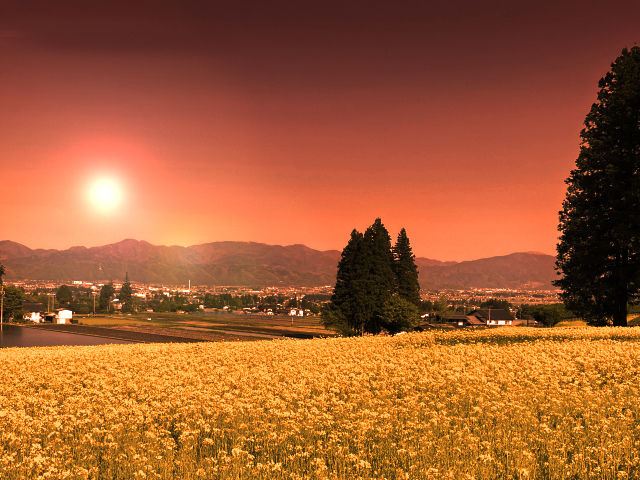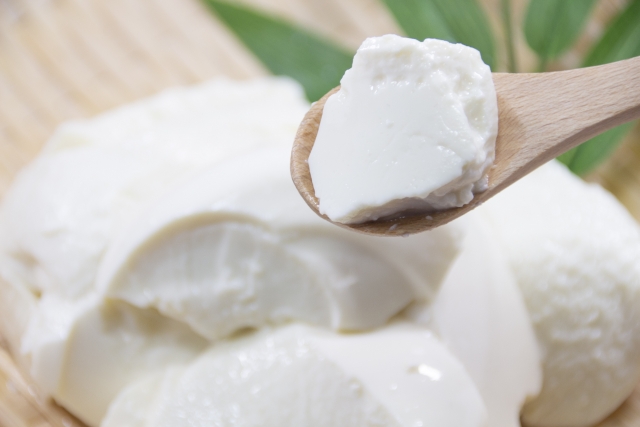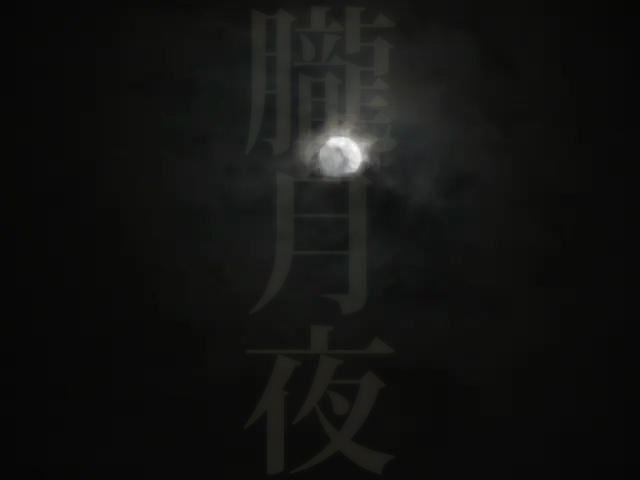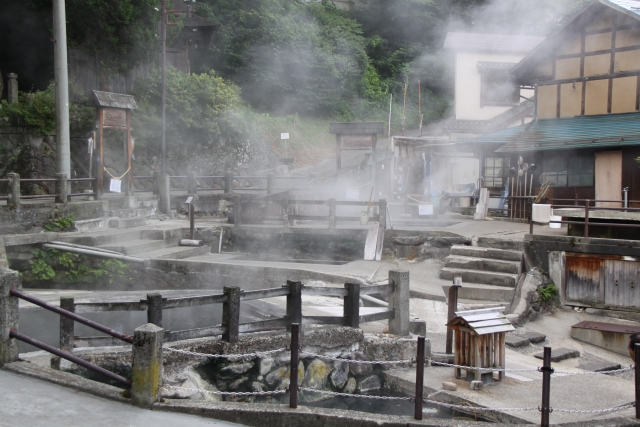Oboro zukiyo
Nanohana batake ni irihi usure
Miwatasu yamanoha kasumi fukashi
Harukaze soyofuku sora wo mireba
Yuuzuki kakarite nioi awashiSatowa no hokage mo mori no iro mo
Tanaka no komichi wo tadoru hito mo
Kawazu no nakune mo kane no oto mo
Sanagara kasumeru oboro zukiyoLyricist:TAKANO Tatsuyuki
Composer:OKANO Teiichi
in1914
Hazy moon night
Sunset sunk in the field of rape blossoms
If you look over the mountain ridge,The heel is deep
Looking up at the sky where the spring breeze blows
The evening moon is pale and it is a wonderful view
The lights of the houses of the village and the deep green of the forest,
People who walk along the road in the rice fields,
The sound of frogs and the sound of temple bells,
It’s all gloomy, hazy moon night

“Oboro zukiyo” – A Famous Song Symbolizing Japanese Spring
“Oborozukiyo” (Hazy Moonlit Night)… On a spring evening, when you look up at the sky from a field of rape blossoms at dusk, you can see the moon dimly appearing and disappearing through thin clouds. Such a moon is called “Oborozuki” (hazy moon) and has become an elegant symbol representative of Japan.
The hazy moon is deeply connected to traditional Japanese aesthetic concepts such as “mono no aware” (the pathos of things) and “wabi-sabi.” The beauty of something unclear or incomplete lies at the heart of Japanese aesthetics. Descriptions of hazy moons can be found in literary works dating back to the Heian period, and many poets and haiku masters have celebrated its phantasmal beauty.

TAKANO Tatsuyuki – Creator of “Oborozukiyo” and the Background of Its Creation
TAKANO Tatsuyuki, a renowned lyricist and Japanese literature scholar, was born in Toyoda Village (now Nakano City) in Nagano Prefecture and spent some time as an elementary school teacher in neighboring Iiyama City. The entire Hokushin region of Nagano Prefecture, which includes Iiyama and Nakano cities, has been a thriving rapeseed cultivation area since the Edo period (1603-1867), and fields of rape blossoms spread all over the area in spring. It’s commonly believed that Takano used this scenery as the motif for “Oborozukiyo.”
However, since rapeseed is cultivated throughout Japan, some say that Takano was reminded of his hometown while living in Yoyogi Uehara, Shibuya Ward, Tokyo in his later years, and wrote about the rape fields there. In Nozawa Onsen Village, Nagano Prefecture, there is a memorial museum called “Oborozukiyo no Yakata HANZAN Bunko,” named after Takano’s pen name, HANZAN.
This song was published in elementary school textbooks in 1914 (Taisho 3) and composed by Teiichi Okano. Its simple yet distinctly Japanese melody has become a masterpiece that remains in the hearts of many people. It beautifully expresses the Japanese sensibility for the four seasons and nostalgia for hometown landscapes.

高野辰之記念館(長野県中野市)に屋外展示。以下、土台銘板より。題号 – 『高野辰之博士像』著作者名 – 原田治展長野県下水内郡豊田村(現・中野市)の村政40周年記念事業として1996年(平成8年)9月製作。, 日本著作権法46条/米国フェアユース, リンクによる
The Charm of Nozawa Onsen as a Hot Spring Resort
By the way, the hot springs in Nozawa Onsen are wonderful and definitely worth visiting.
Nozawa Onsen is a historic hot spring town located in northern Nagano Prefecture, with a history spanning approximately 1,300 years. It features 13 public bathhouses (soto-yu) that are carefully maintained by local residents. It is also internationally known as a ski resort in winter and was even a venue for the 2022 Winter Olympics.
The hot spring town has many traditional inns and restaurants where you can enjoy local cuisine, and it’s also famous as the birthplace of “Nozawana” (a pickled leaf vegetable). It’s a place where you can enjoy the natural beauty of the four seasons and traditional Japanese hot spring culture.
“Oboro” – The Japanese Affection for Ambiguity
Incidentally, the word “oboro” means unclear or vague in outline. The Japanese “fondness for ambiguity” may be reflected in products such as “oboro-dofu,” which remains popular today for its soft texture of tofu scooped out before it fully solidifies.
Japanese culture tends to emphasize “ma” (space) and “yohaku” (blank space), with an aesthetic that values leaving room for imagination by not expressing things explicitly. The beauty of the hazy moon is not in the brightness of a clear full moon, but in the soft light veiled by clouds—a special beauty appreciated by Japanese people.
This concept of “oboro” can be seen in many aspects of Japanese art, literature, and daily life, forming a uniquely Japanese aesthetic sensibility that contrasts with Western cultures that tend to value clarity.

It has been selected as one of the “100 Best Japanese Songs.






コメント